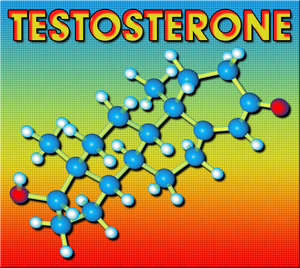Introduction
Testosterone deficiency, a condition increasingly recognized among American males, has profound implications on various physiological functions, including the secretory activity of the prostate gland. This article delves into the biochemical analysis of expressed prostatic secretions in men with low testosterone levels, offering insights into the urological health of this demographic.
The Role of Testosterone in Prostatic Health
Testosterone, the primary male sex hormone, plays a crucial role in maintaining the structural and functional integrity of the prostate gland. It influences the gland's secretory function, which is essential for the composition of seminal fluid. In men with testosterone deficiency, alterations in prostatic secretions can be observed, which may have implications for fertility and overall urological health.
Biochemical Analysis of Prostatic Secretions
A comprehensive biochemical analysis of expressed prostatic secretions in testosterone-deficient men reveals significant changes in the composition of these fluids. Key components such as citric acid, prostate-specific antigen (PSA), and zinc, which are typically found in high concentrations in healthy prostatic secretions, show reduced levels in men with low testosterone. This reduction can affect the pH balance and viscosity of the seminal fluid, potentially impacting sperm motility and fertility.
Impact on Urological Health
The altered biochemical profile of prostatic secretions in testosterone-deficient men is not only a concern for fertility but also for broader urological health. The prostate gland's secretory function is closely linked to its overall health, and any disruption can increase the risk of prostatic disorders, including benign prostatic hyperplasia (BPH) and prostatitis. Moreover, the changes in PSA levels, a marker used in the screening for prostate cancer, necessitate a reevaluation of diagnostic thresholds in this population.
Clinical Implications and Management
Understanding the impact of testosterone deficiency on prostatic secretory function is crucial for the clinical management of affected men. Hormone replacement therapy (HRT) may be considered to restore testosterone levels, potentially improving prostatic function and overall urological health. However, the decision to initiate HRT should be made on a case-by-case basis, considering the individual's overall health status and potential risks associated with the therapy.
Future Research Directions
Further research is needed to fully elucidate the mechanisms by which testosterone deficiency affects prostatic secretory function. Longitudinal studies could provide insights into the long-term effects of low testosterone on prostatic health and the efficacy of interventions such as HRT. Additionally, exploring the role of other hormones and growth factors in modulating prostatic function could offer new avenues for therapeutic intervention.
Conclusion
Testosterone deficiency significantly impacts the biochemical composition of prostatic secretions, with potential implications for fertility and urological health in American males. A thorough understanding of these changes is essential for the effective management of testosterone-deficient men, highlighting the need for personalized approaches in urological care. As research progresses, it is hoped that new strategies will emerge to mitigate the effects of low testosterone on prostatic function, improving the quality of life for affected individuals.
Contact Us Today For A Free Consultation

- Unveiling the Role of Prostatic Acid Phosphatase in Monitoring Androgen Activity During Testosterone Replacement Therapy in Men [Last Updated On: February 21st, 2025] [Originally Added On: February 21st, 2025]
- Testosterone's Impact on Bladder Health: Insights from Electron Microscopy Studies [Last Updated On: March 7th, 2025] [Originally Added On: March 7th, 2025]
- Understanding Urethral Epithelial Atrophy: Impact, Diagnosis, and Hormone Replacement Therapy [Last Updated On: March 8th, 2025] [Originally Added On: March 8th, 2025]
- Testosterone's Impact on Prostatic Stroma: Implications for Prostate Health and Therapy [Last Updated On: March 9th, 2025] [Originally Added On: March 9th, 2025]
- Alpha1-Adrenoreceptor Density, Testosterone, and LUTS Severity in American Men: Clinical Insights [Last Updated On: March 11th, 2025] [Originally Added On: March 11th, 2025]
- Exploring the Impact of Hormone Replacement on Pelvic Floor Electromyographic Activity in Hypogonadal Men [Last Updated On: March 12th, 2025] [Originally Added On: March 12th, 2025]
- Exploring the Dynamics of Post-Void Residual Volume in Men with Testosterone Deficiency: A Longitudinal Study on Testosterone Replacement Therapy [Last Updated On: March 13th, 2025] [Originally Added On: March 13th, 2025]
- Androgen-Dependent Regulation of PDE5 in Prostatic Tissue: A New Frontier in Men's Urological Health [Last Updated On: March 14th, 2025] [Originally Added On: March 14th, 2025]
- Unveiling New Biomarkers: The Role of Urinary Proteomics in Diagnosing Lower Urinary Tract Dysfunction in Androgen-Deficient Men [Last Updated On: March 15th, 2025] [Originally Added On: March 15th, 2025]
- Urinary Flow Cytometry: A Non-Invasive Tool for Monitoring Hypogonadism and TRT Effects [Last Updated On: March 16th, 2025] [Originally Added On: March 16th, 2025]
- Vesicourethral Reflux in Hypogonadal Men: Hormonal and Bladder Neck Dysfunction Insights [Last Updated On: March 17th, 2025] [Originally Added On: March 17th, 2025]
- Ultrasonographic BWT and Urodynamic Parameters in American Men with Late-Onset Hypogonadism [Last Updated On: March 18th, 2025] [Originally Added On: March 18th, 2025]
- Prostatic Aromatase in Aging Men: Risks and Management in Testosterone Therapy [Last Updated On: March 19th, 2025] [Originally Added On: March 19th, 2025]
- Androgen-Regulated Genes in Urothelium: Impact of Hormone Therapy on Men's Health [Last Updated On: March 20th, 2025] [Originally Added On: March 20th, 2025]
- Mitochondrial Function in Bladder Smooth Muscle of Testosterone-Deficient Men: Insights and Implications [Last Updated On: March 20th, 2025] [Originally Added On: March 20th, 2025]
- Prostatic Inflammation in Hypogonadal Men: Histopathology and Testosterone Therapy Effects [Last Updated On: March 21st, 2025] [Originally Added On: March 21st, 2025]
- TRT's Impact on Prostate Health: Insights from Color Doppler Ultrasonography [Last Updated On: March 21st, 2025] [Originally Added On: March 21st, 2025]
- Metabolomic Analysis of Prostatic Fluid in Testosterone-Deficient Men: Urological Implications and Treatment Responses [Last Updated On: March 21st, 2025] [Originally Added On: March 21st, 2025]
- Testosterone's Impact on Bladder ECM: GAGs, Proteoglycans, and Male Urological Health [Last Updated On: March 21st, 2025] [Originally Added On: March 21st, 2025]
- Urinary Exosomal microRNAs: Biomarkers for Hypogonadism and LUTS in American Men [Last Updated On: March 21st, 2025] [Originally Added On: March 21st, 2025]
- Testosterone Deficiency and Urinary Stone Risk: Crystallization Patterns in American Men [Last Updated On: March 21st, 2025] [Originally Added On: March 21st, 2025]
- Testosterone's Impact on Prostatic Gap Junction Proteins and TRT Implications for American Males [Last Updated On: March 22nd, 2025] [Originally Added On: March 22nd, 2025]
- Testosterone Deficiency Impacts Autonomic Innervation and Male Urological Health [Last Updated On: March 22nd, 2025] [Originally Added On: March 22nd, 2025]
- Neural Density in Detrusor Muscle: Hypogonadism's Urological Impact and Management [Last Updated On: March 22nd, 2025] [Originally Added On: March 22nd, 2025]
- Prostatic Neuroendocrine Cells in Androgen-Deficient Men: Analysis and HRT Response [Last Updated On: March 22nd, 2025] [Originally Added On: March 22nd, 2025]
- Testosterone Therapy's Impact on PSA Kinetics and Safety Monitoring in American Men [Last Updated On: March 22nd, 2025] [Originally Added On: March 22nd, 2025]
- Testosterone Deficiency and Bladder Function: Insights from Ambulatory Urodynamic Monitoring [Last Updated On: March 22nd, 2025] [Originally Added On: March 22nd, 2025]
- Urethral Pressure Changes in Hypogonadal Men Before and After Androgen Therapy [Last Updated On: March 22nd, 2025] [Originally Added On: March 22nd, 2025]
- Androgen Deficiency Impacts Bladder Contractile Proteins in American Men: Proteomic Insights [Last Updated On: March 23rd, 2025] [Originally Added On: March 23rd, 2025]
- TRT's Impact on Prostate Health: Assessing Stiffness with Transrectal SWE in American Men [Last Updated On: March 24th, 2025] [Originally Added On: March 24th, 2025]
- TRT's Impact on Micturition Parameters and Serum Hormone Levels in American Men [Last Updated On: March 24th, 2025] [Originally Added On: March 24th, 2025]
- Prostatic Calcifications in Hypogonadal Men: Prevalence, Composition, and LUTS Association [Last Updated On: March 25th, 2025] [Originally Added On: March 25th, 2025]
- Androgen Receptor Distribution in Hypogonadal Men's Lower Urinary Tract: Clinical Insights [Last Updated On: March 25th, 2025] [Originally Added On: March 25th, 2025]
- Testosterone Normalization Effects on Bladder Pressure in Deficient Men: Cystometry Insights [Last Updated On: March 25th, 2025] [Originally Added On: March 25th, 2025]
- Testosterone Replacement Therapy Enhances Bladder Function in Deficient American Males [Last Updated On: March 25th, 2025] [Originally Added On: March 25th, 2025]
- Videourodynamic Assessment and Hormone Therapy for Postvoid Dribbling in Testosterone-Deficient Men [Last Updated On: March 25th, 2025] [Originally Added On: March 25th, 2025]
- TRT Enhances Uroflowmetric Parameters in American Men: A Comprehensive Study [Last Updated On: March 25th, 2025] [Originally Added On: March 25th, 2025]
- Prostatic Urothelial Metaplasia in Hypogonadal Men: Prevalence, Implications, and Testosterone Therapy [Last Updated On: March 26th, 2025] [Originally Added On: March 26th, 2025]
- Testosterone Therapy's Impact on Prostatic Growth Factors and Hyperplasia Risk [Last Updated On: March 26th, 2025] [Originally Added On: March 26th, 2025]
- Uroflowmetry and Hormonal Correlations in American Men with Androgen Deficiency [Last Updated On: March 26th, 2025] [Originally Added On: March 26th, 2025]
- Testosterone Deficiency and Detrusor Overactivity: Urodynamics and Hormone Therapy Effects [Last Updated On: March 26th, 2025] [Originally Added On: March 26th, 2025]
- Testosterone Therapy in Hypogonadal Men: PIN Incidence and Surveillance Protocols [Last Updated On: March 26th, 2025] [Originally Added On: March 26th, 2025]
- TRT-Induced Ultrastructural Changes in Prostatic Smooth Muscle: An Electron Microscopy Study [Last Updated On: March 26th, 2025] [Originally Added On: March 26th, 2025]
- Non-Bacterial Prostatitis and Hypogonadism: Exploring Inflammation and Testosterone Therapy Benefits [Last Updated On: March 26th, 2025] [Originally Added On: March 26th, 2025]
- Bladder Neck Collagen in Hypogonadal Men: Urodynamic Impacts and Therapeutic Insights [Last Updated On: March 27th, 2025] [Originally Added On: March 27th, 2025]
- Doppler Ultrasonography Monitors Prostatic Flow Changes in American Men on TRT [Last Updated On: March 27th, 2025] [Originally Added On: March 27th, 2025]
- Testosterone Therapy's Impact on Prostatic Tissue in Hypogonadal Men: A Morphometric Study [Last Updated On: March 27th, 2025] [Originally Added On: March 27th, 2025]
- Testosterone Fluctuations and Maximum Flow Rate Variability in Hypogonadal Men on TRT [Last Updated On: March 27th, 2025] [Originally Added On: March 27th, 2025]
- Testosterone Deficiency and Nocturnal Polyuria: Mechanisms and Hormone Therapy in American Men [Last Updated On: March 27th, 2025] [Originally Added On: March 27th, 2025]
- PSMA Expression Analysis in Androgen-Deficient Men Before and After Hormone Therapy [Last Updated On: March 27th, 2025] [Originally Added On: March 27th, 2025]
- Testosterone Therapy Enhances Urethral Sphincter Function in Hypogonadal Men: EMG Insights [Last Updated On: March 28th, 2025] [Originally Added On: March 28th, 2025]
- Testosterone Therapy's Impact on Prostate Health: A Histomorphometric Analysis [Last Updated On: March 28th, 2025] [Originally Added On: March 28th, 2025]
- Prostatic Stromal Androgen Receptors: Key to Managing LUTS in American Men [Last Updated On: March 28th, 2025] [Originally Added On: March 28th, 2025]
- Androgen Therapy Modulates Apoptotic Index in Hypogonadal Men's Prostatic Epithelium [Last Updated On: March 28th, 2025] [Originally Added On: March 28th, 2025]
- LOH Impact on Bladder Compliance: Urodynamic and Hormonal Insights in Aging Males [Last Updated On: March 28th, 2025] [Originally Added On: March 28th, 2025]
- DSD in Androgen-Deficient Men: Prevalence, Urodynamics, and Hormonal Insights [Last Updated On: March 28th, 2025] [Originally Added On: March 28th, 2025]
- Neurogenic Bladder in Hypogonadal Men with Metabolic Syndrome: Urodynamics and Hormonal Insights [Last Updated On: March 28th, 2025] [Originally Added On: March 28th, 2025]
- Androgen Deficiency's Impact on Detrusor Oxygen Tension and Testosterone Therapy Benefits [Last Updated On: March 29th, 2025] [Originally Added On: March 29th, 2025]
- Bladder Sensation Mapping in Testosterone-Deficient Men: QST Before and After HRT [Last Updated On: March 30th, 2025] [Originally Added On: March 30th, 2025]
- 3D Ultrasonography: Monitoring Prostate Health in Men on Testosterone Therapy [Last Updated On: March 31st, 2025] [Originally Added On: March 31st, 2025]
- Testosterone Deficiency Impacts Bladder Capacity: HRT Benefits in American Males [Last Updated On: April 1st, 2025] [Originally Added On: April 1st, 2025]
- Prostatic Aromatase Activity and Estrogen's Role in LUTS Among Aging American Men [Last Updated On: April 1st, 2025] [Originally Added On: April 1st, 2025]
- Computerized Urethral Pressure Analysis in Hypogonadal Men Pre- and Post-TRT [Last Updated On: April 2nd, 2025] [Originally Added On: April 2nd, 2025]
- Androgen Receptor Sensitivity: Predicting Testosterone Therapy Outcomes in Men's Urological Health [Last Updated On: April 5th, 2025] [Originally Added On: April 5th, 2025]
- Testosterone Deficiency and Bladder Health: Suburothelial Myofibroblast Insights for American Men [Last Updated On: April 5th, 2025] [Originally Added On: April 5th, 2025]
- Bladder Wall Fibrosis in Men: Grading, Testosterone Deficiency, and Hormone Therapy Benefits [Last Updated On: April 6th, 2025] [Originally Added On: April 6th, 2025]
- Prostatic Elastography: Assessing Tissue Stiffness in Men on Testosterone Therapy [Last Updated On: April 7th, 2025] [Originally Added On: April 7th, 2025]
- Diurnal LUTS Variations in Hypogonadal Men Linked to Testosterone Rhythms [Last Updated On: April 9th, 2025] [Originally Added On: April 9th, 2025]
- TRT Modulates Prostatic Epithelial Cell Autophagy in Hypogonadal Men: A Review [Last Updated On: April 9th, 2025] [Originally Added On: April 9th, 2025]
- OAB in Androgen-Deficient Men: Prevalence, Symptoms, and Testosterone Therapy Benefits [Last Updated On: April 10th, 2025] [Originally Added On: April 10th, 2025]
- TRT Enhances Periurethral Vascularity in American Men: Power Doppler Insights [Last Updated On: April 11th, 2025] [Originally Added On: April 11th, 2025]
- Differentiating and Treating Prostatitis-like Symptoms in Hypogonadal Men with Testosterone Therapy [Last Updated On: April 13th, 2025] [Originally Added On: April 13th, 2025]
- Intraprostatic Hormone Levels in American Men: Testosterone Therapy Impacts and Management [Last Updated On: April 13th, 2025] [Originally Added On: April 13th, 2025]
- Mathematical Modeling Predicts Prostatic Growth in TRT for American Men [Last Updated On: April 14th, 2025] [Originally Added On: April 14th, 2025]
- Electrophysiological Insights into Bladder Nerve Activity in Testosterone-Deficient American Males [Last Updated On: April 14th, 2025] [Originally Added On: April 14th, 2025]
- Neurourological Assessment Protocol for Autonomic Neuropathy in Testosterone-Deficient American Men [Last Updated On: April 15th, 2025] [Originally Added On: April 15th, 2025]
- Testosterone Deficiency and Urinary GAG Levels: Biochemical Insights and Clinical Implications [Last Updated On: April 16th, 2025] [Originally Added On: April 16th, 2025]
- Testosterone Therapy Enhances VUJ Functionality in Androgen-Deficient Men: Videourodynamic Insights [Last Updated On: April 16th, 2025] [Originally Added On: April 16th, 2025]
- Urinary NGF as Biomarker for LUTS in Testosterone-Deficient Men: Diagnostic Potential [Last Updated On: April 17th, 2025] [Originally Added On: April 17th, 2025]
- CEUS: A Novel Approach to Assess Urethral Mucosal Vasocongestion in Hypogonadal Men [Last Updated On: April 17th, 2025] [Originally Added On: April 17th, 2025]
Word Count: 477





















